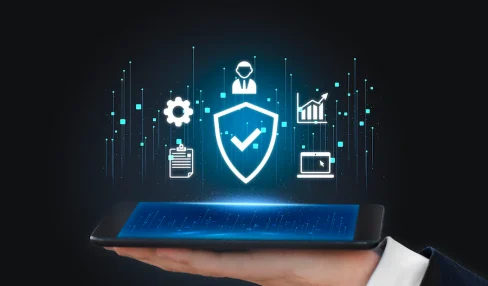Why Everyone Should Know The Basics Of Cybersecurity For Their Device
5 Mins Read
Published on: 09 March 2023
Last Updated on: 08 November 2024

toc impalement
In today’s world, technology is an integral part of our daily lives, and with it comes the risk of cyber attacks.
As we store more and more of our personal and sensitive information on our devices, the importance of cybersecurity becomes increasingly paramount. Every individual who uses a device should have a basic understanding of how to protect themselves from potential cyber threats.
With the rise of cybercrime, it’s no longer just big corporations and government organizations that are at risk – everyone is a potential target. Understanding the basics of cybersecurity can help protect you and your personal information from cybercriminals.
Types Of Cybersecurity Threats
Malware is a type of software that is designed to have unauthorized access to personal data and also cause damage to a computer system. It can take many forms, including viruses, worms, and trojans.
Once cyber access is installed on a device, it can allow cybercriminals to steal personal data or damage the system. Malware can be spread through email attachments, infected websites, or unsecured downloads.
Phishing attacks are social engineering tactics used to trick people into revealing sensitive information such as login credentials, financial information, or personal data.
Cybercriminals use phishing attacks through email, text messages, or social media to appear as if they are a trusted entity, such as a bank or a government agency, in order to lure the victim into clicking on a malicious link or downloading an infected attachment.
Identity theft is a type of cybercrime that involves stealing someone’s personal information to commit fraud or other crimes. This information can be used to open credit accounts, make purchases, or file fraudulent tax returns.
Hacking is the first term associated with the basics of cybersecurity, which refers to unauthorized access to the computer system or network. Hackers can exploit vulnerabilities in software or systems to gain access to sensitive data, disrupt services, or cause damage to the system.
Hacking attacks can be motivated by financial gain, espionage, or activism. Hackers often use malware or phishing attacks to gain access to systems and can also exploit weak passwords or unsecured networks.
Background Checks

Background checks can play a crucial role in ensuring the basics of cybersecurity by identifying potential threats that might come from insiders. Employers, businesses, and individuals can utilize background checks to uncover information about a person’s criminal history, financial background, and other crucial information that can help identify possible threats to cybersecurity.
Background checks can reveal whether the person has been involved in any cybercrime in the past or whether they have any tendencies that could make them a risk for data breaches. By uncovering such information through background checks, people can take the necessary precautions to minimize the risks of cybersecurity threats.
When using a background check service, it is important to use a reputable one that provides accurate, up-to-date, and relevant information. The internet is filled with many background check services that claim to provide the best results, but not all of them are reliable. Employers, businesses, and individuals use these services, to get the best results. It can ensure that you get reliable information that is accurate and up-to-date.
When selecting a background check service, there are a few factors to consider. One should first look at the reputation of the service, how long it has been in business, and its certifications. It is also essential to look at the scope of the service and the type of information it provides.
Finally, look at the accuracy and reliability of the information that the service provides. With a reputable background check service, individuals and organizations can safeguard themselves against cybersecurity threats.
Best Practices For Cybersecurity
Strong passwords and two-factor authentication are essential to ensure cybersecurity. It’s recommended to create complex passwords that include uppercase and lowercase letters, numbers, and symbols.
The basics of cybersecurity through two-factor authentication is an additional layer of security that requires users to enter a code sent to their phone or email, in addition to their password, to access an account.
Updating software and operating systems regularly can help protect against security vulnerabilities. Cybercriminals can exploit security gaps in outdated software to access sensitive information. Regular updates often include security patches and bug fixes to protect against new threats.
Backing up data is essential in case of a cyberattack or device failure. It is important to regularly back up important files to an external hard drive or cloud storage service. This can help minimize data loss in case of a cyber incident.
Using antivirus and anti-malware software can protect your devices from cyber security management-associated malicious software, viruses, and other cyber threats. It is essential to use reputable software and keep it up-to-date to ensure maximum protection.
Avoiding public Wi-Fi and instead using a secure connection can help reduce the risk of cyber attacks. Public Wi-Fi networks are often unsecured. This is also easier for hackers to intercept personal information. Using a secure connection, such as a virtual private network (VPN), can help protect sensitive information while using public Wi-Fi.
Cybersecurity For Businesses

Nowadays, businesses of all sizes are relying on technology more than ever before to store and manage their data. As a result, protecting that data from cyber threats has become a critical issue.
Cybersecurity is vital for businesses to safeguard their data and their customers from potential breaches, data loss, and other cyber-attacks.
Businesses should implement cybersecurity best practices, such as updating their software, using strong passwords, implementing two-factor authentication, and training employees on proper data handling and privacy practices.
Additionally, businesses should conduct regular security assessments and use reputable cybersecurity tools and services to protect their data.
The basics of cybersecurity and data breaches can have a significant impact on a business, ranging from financial losses to damage to its reputation. The consequences of data breaches can be severe, including legal penalties and loss of customer trust.
Cybercriminals often target businesses, as they often have more valuable data than individual users. The impact of a data breach can also vary depending on the severity of the breach and the type of compromised data.
It is essential for businesses to have a plan in place to respond to and recover from a data breach, as well as implement proactive cybersecurity measures to prevent future attacks.
Key Takeaways
The basics of cybersecurity knowledge are essential for everyone to protect their personal data and privacy in the digital world. By knowing the basics of cybersecurity, individuals can ensure that their devices are secure and protected from threats such as malware, phishing attacks, identity theft, and hacking.
In addition, businesses must also take the necessary steps to protect their data and customers from cyber threats, as data breaches can have a devastating impact on their reputation and bottom line.
Background checks can also play a role in cybersecurity, as they can help individuals and businesses ensure that they are working with trustworthy partners. By using strong passwords, updating software, backing up data, and avoiding public Wi-Fi, individuals, and businesses can take the necessary steps to stay safe online and protect their sensitive information.
Read Also:


















Comments Are Closed For This Article